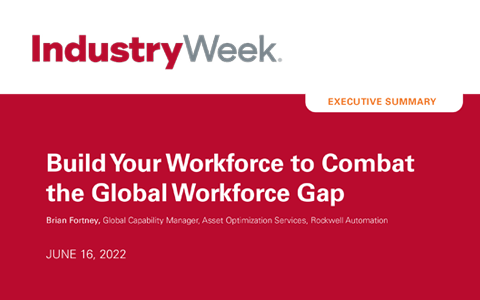EXECUTIVE SUMMARY
Build Your Workforce to Combat the Global Skills Workforce Gap
- The skills gap is challenging the global workforce.
- Achieving an agile and flexible workforce can be accomplished by marketing the industry, the quality of life, and the company.
- Establish workforce flexibility to support and augment the workforce.
- To remain productive, train and retain.
- Rockwell Automation provides an entire ecosystem of industrial training in one environment.
The manufacturing industry skills gap has created significant challenges for organizations. However, with a workforce strategy that provides support, augmentation, and training, manufacturers can mitigate many risks to production, strengthen their workforce, and fill critical manufacturing positions.
Rockwell Automation offers services that companies need to implement a holistic workforce strategy for today and the future. In addition to multiple support options and field technician augmentation service, Rockwell Automation’s e-learning and virtual training platform makes more training available anytime, anywhere, and with more language and ease than ever before.
Build Your Workforce to Combat the Global Skills Workforce Gap
Build Your Workforce to Combat the Global Skills Workforce Gap
Speaker


The skills gap is challenging the global workforce.
retirement
to train and retain
Achieving an agile and flexible workforce can be accomplished by marketing the industry, the quality of life, and the company.
– Brian Fortney, Rockwell Automation
Establish workforce flexibility to support and augment the workforce.
Spending less time reacting and more time planning allows organizations to be proactive at scale. This means putting systems in place to help people partner, leveraging technology in the industrial automation space, and supporting investments in technology with reinvestment in existing workers or recruiting additional workers.
Managing, maintaining, and optimizing the technology of digital transformation requires people who have the critical skills to optimize data flow, contextualize data, and drive information and insights that can help make businesses more productive. Partnerships to support or augment an in-house workforce are helpful when an organization lacks the skills or bandwidth for a project.
To remain productive, train and retain.
A key to employee retention is to provide employees with training. Continue their development, invest in them, and help them to see how they're being invested in. This fosters appreciation, which drives engagement and retention.
Investment in employee training has a positive impact on retention in three ways:
There are three primary purposes for training, and providing training in all three areas supports a safe and sustainable workforce:
to fulfill legal and local regulatory requirements.
to raise output, reduce downtime, and lower overall risk.
to give employees more of the right skills to develop and grow.
Rockwell Automation provides an entire ecosystem of industrial training in one environment.
Additional Resources


A workforce strategy that provides support, augmentation, and training, manufacturers can mitigate many risks to production, strengthen their workforce, and fill critical manufacturing positions.
Empower Your Lifecycle Journey
